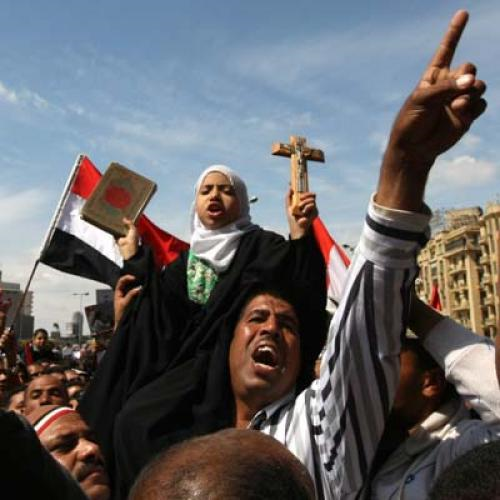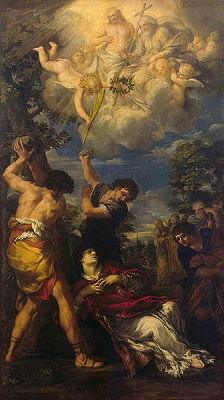The Coptic Christians of Al-Galaa village in Minya,
Egypt Have Been Repeatedly Attacked Because of the Construction of a Village Church
By ICC's Egypt Representative and Todd Daniels, Regional Manager for the Middle East
10/12/2015
Washington, D.C.
International Christian Concern
After Christians in the of Al-Galaa village in Samalout, Minya, Egypt received permission to expand the church serving three villages, fanatic Muslims have increased their attacks on Christians and their property.
In early January 2015, church elders in Al-Galaa finally received a positive decision but, since then, attacks and threats have plagued the construction process. The Christian community has faced numerous attacks without protection or prosecution of the attackers by the authorities. In the latest attack, last week two Christians were injured and the crops of lands owned by Copts were destroyed.
Permission for a New Church Sparks New Tensions
The story goes back to January 15, 2015 when the Coptic Christians of Al-Galaa village obtained permits from the government to construct a bigger church to serve the Christians of this village, instead of their old, ramshackle and narrow one.
"Our old church was ramshackle and very small, only 75/sq meters. It was very crowded as it doesn't serve only the Christians of this village, but also two nearby villages," Fr. Tadros El-Komos Ibrahim, the priest of St. Mary Coptic Orthodox church in Al-Galaa village, told International Christian Concern (ICC).
"We had submitted many requests to the government to obtain permits to construct a church," Fr. Tadros continued. "On January 15, 2015, we were able to obtain the permits of the construction of our church with three floors on an area of 400 meters instead of its previous narrow area [of] 75 meters."
After obtaining the construction permits, the fanatic Muslims protested this decision and prevented the Christians from constructing their church. Then, a first customary meeting session was held in the village in the presence of security to come to a compromise for the two sides.
The Salafists put five conditions for the construction of the village church. Their conditions were that the church must be rebuilt on the same area, 75 meters instead of 400 meters, and it must be one floor only not three floors. They also demanded that its doors may not be opened to the main street, and the church must be without a bell tower, cross, or bell.
"We refused the Salafists' incapacitating conditions, because they were against our aim which was the expansion of the church space. So the church members organized a protest in front of the building of Minya Governorate and protested in the front of the police station of Samalout to express our rejection to the Salafists' decisions," said Fr. Tadros.
At the second customary reconciliation session held in the home of the village's mayor, together with the security services, the conditions were changed. They agreed that the church may be rebuilt on the full 400 meters, but its height could be no more than 8 meters. They also maintained that its doors may not open into the main street and there would be no bell tower or bell.
"We also didn't accept the conditions of the second reconciliation meeting," Fr. Tadros recounted, as this would have still put new limits on the church in the village.
On April 4, 2015, a large group of Muslim young men attacked Coptic homes in the village without any provocation.
They used knives and sticks, which resulted in the injury of more than 20 Christians. They also attacked a car carrying a number of Christian students from the village with stones. The parents of the students then went to see the details of the incident and clashed with the attackers, which resulted in the injury of twelve more Christians.
The security forces arrived in the village and arrested 20 Christians and 15 Muslims, but they didn't arrest all the attackers.
Despite the arrest of some Muslims, the attacks against Christians renewed on the next day. The attackers damaged some of the agricultural crops owned by Christians.
In the aftermath of these attacks, a third customary reconciliation session was held in the presence of security, and they agreed that the church will be rebuilt on the full area of 400 meters and with three floors, but to be without a bell tower or bell. They also pressed for the Christians to waive all of the complaints which were filed against the Muslims as a result of the April attacks.
"We had to accept the conditions of this reconciliation meeting to calm the situation and to begin to build the church," Fr. Tadros said.
"We waived the complaints against them and on April 14, the police then released all the arrested Christians and Muslims. On April 16, we began to rebuild our church," Fr. Tadros said.
"It is dangerous that the customary reconciliation sessions replace law," Ezzat Ibrahim, director of al-Kalma Center for Human Rights in Minya told ICC.
"These sessions have become a tradition, especially in Minya Governorate, when a sectarian clash erupts. Unjust conditions are imposed on Christians in these customary sessions but they accept them because they are afraid," Ezzat continued.
"The state should stop these customary reconciliation sessions and allow the law to replace them," said Ibrahim.
An Agreement, but No Peace for Christians
Despite the agreement of the construction of the village church according to the Salafist conditions, which were accepted in the last reconciliation meeting, the attacks against Copts, their agricultural crops, and homes haven't stopped.
On September 26, four Muslims attacked two Coptic Christians named Saeed Abdullah and Afifi Farahat, resulting in the injury of Saeed Abdullah in his head.
"I went with the two Coptic persons who were attacked by the four Muslims to Samalout police station and filed a report. We named the four Muslims, Mahmoud Mokhtar Naaman, Foley Nasser Foley, Mahmoud Abdullah Mukhaimar and Ehab Saeed Zahran, who were responsible for attacking and injuring the two Christian men," Atta Youssef Hanna, a Christian lawyer from Ezbet Rafla village, Samalout and resident in Samalout city told ICC.
"Although we gave the names of the four attackers to the police and asked for their arrest, none of them [have] been arrested up [until] now," Rafla said.
The inaction, indifference and complicity of police led those assailants to repeat their attacks on Christians without fear, because there was no punishment for them.
Christian Farmlands Destroyed While Authorities "Investigate"
Despite the police report against the attackers, the attacks continued. On Monday, September 28, those assailants destroyed potato and beet plants on four acres of land owned by Copts.
"I have one and have acres cultivated potato plants. On Monday morning, September 28, I found all the potato plants of my land were destroyed," Samir Shafiq Shehata told ICC. "They didn't destroy the plants of my land only, but they destroyed potato plants of another neighbour, an acre of beet plants owned by two others," Shehata said.
"We headed to the police station to file a report on the damage of our agricultural crops, but the police refused to make a formal report for us and told us that they should investigate the matter first with the village mayor," Shehata said.
The September crop destruction was just the latest incident. "More than 15 acres of crops owned by Coptic Christians in Al-Galla village have been damaged since April 2015," according to Shenouda Saeed, a Christian resident in Al-Galaa village.
Young People Also Attacked, Kept From School
The Christian adults in Al-Galaa village aren't the only ones who suffer as a result of these ongoing attacks; their children do as well.
Muslim students have attacked the Christian students after the end of the school day. They have beaten and insulted them, resulting in the absence of many Christian students.
"I have two sons; one of them is a student in grade five of primary school and the other one is [a] student in grade two of prep school. They don't want to go their school because of the ongoing harassment of the other Muslim students to them," said Youssef Morris, a Christian resident in Al-Galaa village.
The Need for Peace and Security
These continued attacks on Christians have highlighted two serious problems that are common throughout the villages of Upper Egypt, Father Estafanous Shehata, the assistant of Bishop Bevnotious, the Bishop of Samalout told ICC.
"There are two problems causing these ongoing attacks against Copts. The first one is the culture of the people, the way that they deal with the other and accepting the other, those of differing religious groups. This problem needs a solution from more than one side. It must involve the institutions like mosques, churches, and schools."
"The second problem," he continued, "is the lack of control by security forces. If there was a dispute between two Muslim sides, the security could control the situation and solve it. In contrast, when the dispute was between Muslims and Christians we then find that the police cannot control the situation.
The story of al-Galaa village is one that can be repeated over and over again across the country. Despite promises and rhetoric from the government about the rights of all Egyptians - Christian and Muslim - the reality continues to be something different.
While many Egyptian Christians maintain a positive opinion of President Sisi, one can only wonder how many more attacks Christians will be able to survive.
For interviews, contact Olivia Miller, Communications Coordinator: press@persecution.org
# # #
You are free to disseminate this news story. We request that you reference International Christian Concern (ICC) and include our web address, www.persecution.org. ICC is a Washington D.C.-based human rights organization that exists to help persecuted Christians worldwide. ICC provides Awareness, Advocacy, and Assistance to the worldwide persecuted Church. For additional information or for an interview, contact ICC at 800-422-5441.
International Christian Concern
2020 Pennsylvania Ave. NW #241
Washington, D.C. 20006
www.persecution.org | E-mail: icc@persecution.org



 RSS Feed
RSS Feed